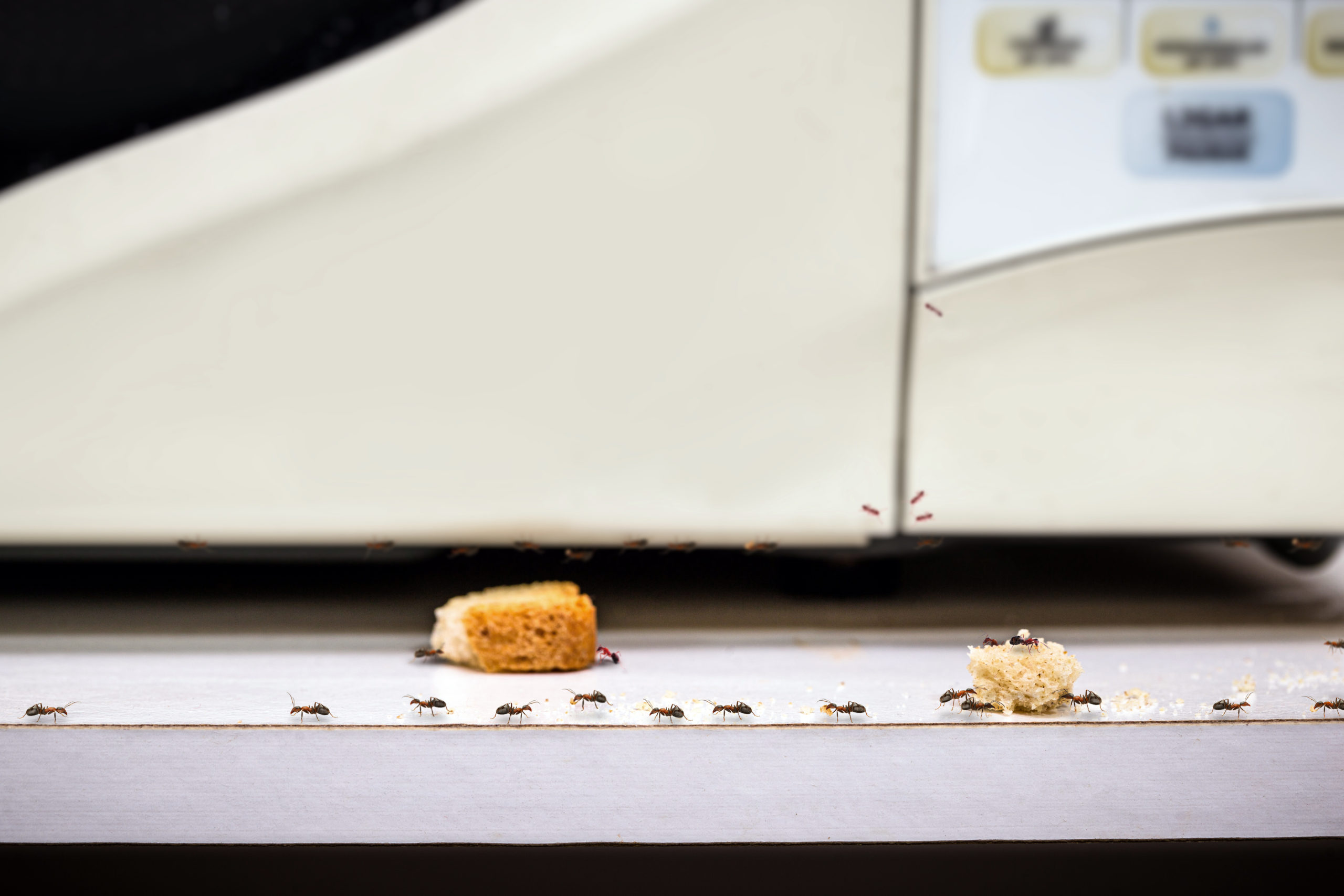The Keys to Successful College Dorm Pest Control
The Keys to Successful College Dorm Pest Control
There are many perks to living on campus for a college student, especially if the school is a ways away from your home. It is very convenient to walk to class in the morning and easily head back to the dorm after a long study session in the library. But as anyone who has experience living in these on-campus buildings can tell you, there are some definite downsides as well. Besides roommate troubles and the struggle of having to wait for an available shower in the morning, there are some common issues that are only heightened from living in a house. One such issue is the increased risk of pest infestations, thanks to the abundance of food and oftentimes lack of chore regulation. Thankfully, there are some steps you can take to make sure that the only constant guests in your dorm are fellow tired and sociable college students, not pests.
Be Prepared

The first step to conquering any problem is preparation, as it can mean the difference between success and failure. There are some easy yet effective ways to prevent pests of all kinds from invading this shared space. It may be disheartening to add a few more things to your ever-growing dorm packing list, but trust us: it will be greatly beneficial in the long run.
The first and often overlooked section is the bed. There is no telling how many college students have slept on the same camp-issue twin mattress, which is not something you want to think about as you try to sleep on it. There are special covers you can purchase for these (or any size) beds to protect yourself from whatever may be lurking within. Mattress covers and pillow covers should be at the top of your shopping list every year, as it is best to throw them out at the end of the school year and start over to prevent spreading anything that is within the cover. These covers are easy to use, as they are simple white covers that encase your entire pillow and mattress separately, with a complete zip-close around the edges. Be sure to buy the ones that specifically say they protect against bed bugs, allergens, and dust mites to get the ones that are actually effective against these common issues. There is enough to stress about as a college student; you don’t want to add “bed bugs” to that list.
Speaking of staying clean, cleaning supplies are also very important to keeping a pest-free dorm. If you are living in a typical dorm, there will likely be a common area equipped with basic cleaning supplies from the RA or cleaning staff. In this case, a container of disinfecting wipes should suffice for your dorm room. These are great for keeping your desk, wardrobe, bedposts, and even windowsill clean of crumbs and debris. Pests often invade when there is something enticing on the other side of the wall, so eliminating these small crumbs will take away a major attraction for pests. But if you live in an apartment with multiple roommates, the easiest way to make sure every base is covered is to coordinate who is bringing which cleaning supplies. Students in this situation have reported that it was most helpful to create a chart or spreadsheet with every roommate on it, and evenly dividing up the supplies to buy before the school year.
These are some essentials that are most useful and relevant for a college apartment/shared dorm space:
- Disinfectant wipes
- Multi-surface disinfectant spray
- Glass cleaner
- Hand soap
- Dish soap
- Sponges
- Carpet stain remover
- Trash bags
- Vacuum (the cost can be split among multiple roommates)
- Multi-floor sweeper with dry cloths
Of course, every apartment and roommate situation differs. What is essential for one apartment is not super important for another. These are just some suggestions on what to keep underneath the kitchen sink for a clean space.
Chore Time

A lot of the appeal of living on campus is feeling semi-independent and making your own rules in conjunction with your roommates. But unfortunately, chores are still important in a college dorm. They might be even more important, just considering how many different students and friends walk through the space every day. In the world of pest prevention, cleaning and tidying are some of the most important tasks to do.
Teamwork is the key in completing chores with roommates. One common problem that roommates run into is a complete difference in living styles, which translates into cleaning habits. One student washes their dishes immediately after using them, while another will leave their dishes in the sink for weeks and not seem to care. This is the source of many roommate arguments, which we can personally agree are no fun. The best way to get ahead of this problem is to make some kind of chore system where the duties rotate. This will ensure that every chore gets done and works to create a clean, pest-free space. If there are multiple roommates within the smaller shared space, you could all work together to create a chore chart that evenly distributes the chores among roommates while switching the tasks every so often. For example, one roommate can clean the floors every weekend for one month and one can clean the bathroom sink areas, then they switch the next month. You can even make an aesthetically-pleasing chore chart and hang it in the kitchen or common area to refer to later in the school year if troubles start to arise. Trust us, compromise and fairness will be your best friends in this situation, no matter how friendly everyone is at the beginning of the year.
Every cleaning task helps to prevent pests and maintain a healthy environment, but there are certainly some that prove to be the most effective. For one, taking out the trash is essential in keeping a clean space. While no human realistically wants to hang out in the kitchen next to a smelly, overflowing trash can, pests love this unintentional decor. Roaches, ants, rodents, and flies especially seek out trash for the abundance of food they find. This would be a task to include on the chore chart if you foresee this becoming an issue. Other productive chores are washing dishes and wiping down kitchen surfaces. Even though the kitchen is probably laughably small, there can still be an accumulation of crumbs and spills after cooking and eating. Outside of the kitchen, keeping all dirty clothes in a hamper and off the floor prevents larger pests, like rodents, from making their nests in the material. Plus, it will be a great help to the overall look of the room if there aren’t dirty clothes everywhere.
Must Have Snacks

Any college student will tell you that food and caffeine are absolute essentials throughout the semester. Some of the most fun times in a shared living space are spent over piles of junk food or staying up way too late because no one is tired after getting iced coffees at 10:00 pm for a study party. Pests love these random food findings too, but not for any reason that we like. Some selfish pests, like roaches, take food for themselves and their insatiable appetites. Other pests are eusocial and steal food for their colony, like ants and wasps. With this in mind, a huge area for preventative pest control is all about the food and drink storage.
There often has to be a level of creativity when it comes to storage solutions in dorm life. Even though you didn’t take your whole life with you, it can definitely feel that way when you find yourself buying yet another container to throw things in. As tough as things may be with storage, it is crucial to keep all food items off of the floor. Even a snap-top plastic tub stored under the bed is better than nothing, since it is secure against pests. But the main thing to remember is to keep all opened snacks and food items as sealed as possible, ideally in a cabinet or other area of the shared kitchen. This means using whatever you have or are willing to purchase to keep your food secure: chip clips, zip-top bags, lidded containers, or locking lid containers. You can either write your name directly on the container or on a piece of tape that you stick on there if your dorm has an issue with snack theft (another strangely common dorm issue…).
Clean-up after eating is possibly just as important to pest prevention as food storage is. We touched on washing dishes earlier, but it bears repeating as a crucial chore. Food residue on dishes, whether on the counter or in the sink, are extremely attractive to hungry pests who are not picky eaters. You don’t have to wash dishes the second you finish eating, but simply rinsing the dish first is enough for now. It’s the same story with drinks; rinse out cups at least, and try to use cups with lids for drinks other than water. Snacking in bed is sometimes the only option if the common area is packed or if a late night homework session requires some brain food, but make sure to clean up any crumbs left over. Mattress and pillow covers protect against bed bugs, not a colony of ants or team of roaches that are on the hunt for crumbs!
Common Culprits

Different regions and climates make for a wide variety of pests that plague our universities, and it would take a long time to list every pest that can be found on a specific college campus. So we will just briefly focus on the three most common college pests that often find the dorm life more interesting than the students.
- Ants – This may be an obvious one, given the extra focus on food storage. But that is because ants are one of the most common pests in the country in general, which means they are frequent dorm invaders as well. The kitchen area, no matter how minimal, is their typical target for the food residue, spills, crumbs, water, and improperly-stored snacks. They can also invade the actual dorm rooms if there are enough crumbs and food to draw them in.
- Bed Bugs – Even with many students utilizing the mattress and pillow covers, bed bugs are still an issue in some dorms. The problem is not only with mattresses that have been shared by students from all over, though that is a reason. Bed bugs are notorious for hiding within fabric of any kind to get to a new destination with fresh blood. Luggage, secondhand furniture (especially chairs), and backpacks are all fair game for these pests. Just be sure to double check everything before transporting, and you should be good to go!
- Flies – An annoying pest in every regard, flies are a common dorm pest, particularly for those schools in warmer climates. The kitchen trash is a clear draw for flies, as it contains all of the food residue and spills they could ever want. Another main reason for an influx of flies is when someone props the front door open for fresh air, provided it leads directly outside. This is unfortunate since it’s a nice way to air out the shared space, especially when someone burns their late-night snack that they left in the oven about ten minutes too long.
Reporting the Pest Issues

Now that we’ve looked at some effective prevention methods and common pests, what happens if there is a pest problem? This answer can be summed up in one word: communication. Ask your roommates if they noticed the pest invasion and if they found them in other parts of the dorm. If the invasion is more than a few small insects, or if it involves larger pests like rodents and roaches, be sure to report it to your RA (Resident Advisor) and maintenance team immediately. Be as detailed with your report as possible by explaining what kind of pests, where they are, and how large the invasion is. If you have to submit a maintenance request online, it can help your explanation to attach a photo of the pests if possible. Make sure to communicate with your roommates if you report the pest issue so they know that steps are already in motion. One of the perks of living in an on-campus space is that you don’t have to face pest issues alone. Your maintenance or grounds crew team will handle it, and they know to call in the pros if the need arises.
In general, food storage, chores, and roommate compromise are central to the prevention of pests in a shared dorm or apartment space. It is just as important to take care of old or pest-infested food as it is to store in the first place; please make sure to throw out any contaminated food before someone unknowingly eats it! But pest issues do happen in college, and they are not fun. That is why professional pest control technicians are dedicated to solving pest problems of all kinds. Our team services both homes and businesses, and will be happy to provide an inspection for your pest concerns. Contact us to learn more about our EPA-approved treatments and how we can prevent pests from adding to the stress of a homework-filled school year.
8 Creative Ways to Have a Pest-Free Fourth of July
8 Creative Ways to Have a Pest-Free Fourth of July 8 Creative Ways to Have a Pest-Free Fourth of July Summary: The Fourth [...]
A Simple Guide to Preventing Stinging Pests
A Simple Guide to Preventing Stinging Pests A Simple Guide to Preventing Stinging Pests Summary: Stinging insects are more active in warm weather, [...]
These 10 Natural Mosquito Repellents Can Actually Help
These 10 Natural Mosquito Repellents Can Actually Help These 10 Natural Mosquito Repellents Can Actually Help Summary: Natural mosquito repellents are easier to [...]
How to Get Rid of Carpet Beetles
How to Get Rid of Carpet Beetles How to Get Rid of Carpet Beetles Summary: Carpet beetles are sneaky pests that don’t usually [...]
How Do Roaches Affect Asthma and Allergies?
How Do Roaches Affect Asthma and Allergies? How Do Roaches Affect Asthma and Allergies? Summary: It’s no secret that pests impact human health, [...]
These 5 Carnivorous Pests Might Surprise You!
These 5 Carnivorous Pests Might Surprise You! These 5 Carnivorous Pests Might Surprise You! Summary: There are many eco-friendly ways to prevent pests, [...]

